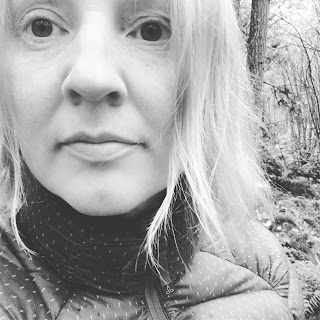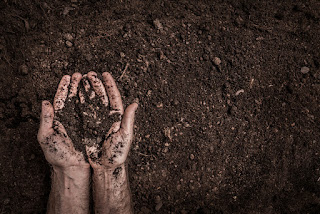Why We Get Sick
Disease, discontent, illness, depletion, exhaustion, pain...
chronic...these are states that many of us embody whether it shows up in
ongoing or acute health challenges, addictions, mental disturbances,
existential crisis, or an undefined sense of something being not quite right.
We are depressed, anxious, overweight, lonely, hypertensive, apathetic,
disconnected, and discouraged. What is going on? Why are so many of us
sick and tired and unable to feel well?

In my experience, these many faces of imbalance and diminished vitality are visible across political, racial, economic, and gender lines. As a systems thinker and big picture explorer, I am constantly looking for the path that connects the dots between seemingly disconnected proofs of an internal world in flux.
As much as we have been taught
to pop a pill or buy a product to soothe a symptom from headache to feeling
frumpy, the quick fix never lasts because we do not live in a vacuum. We are,
like trees, deeply intertwined with our environment, our roots and branches
interlace with other life forms beneath the surface and rub up against other
systems of support above ground.
And yet, we are told that the
greatest achievment an individual can aspire to is to "stand on your own
two feet", to be "ruggedly independent", and live life on your
own terms. The trouble is, we can't produce our own food with our bodies (like plants), we
don't make the water we need to survive, and most of us aren't hairy enough to
clothe ourselves in garments of our own production (like animals).
We need a community to both
meet our needs and create meaning for the experience of birth, death, rebirth,
grief, and celebration over the life cycle of a human. Unfortunately, most of
us in the industrialized world have lost this container due to constantly
moving for work, better opportunities, and quite frankly, because the
colonization model of settlement and conquering requires dividing repositories
of indigenous knowledge and scattering it so that continuity of meaning and
relationship become impossible.
When we remember where we have
been, what we can provide for ourselves through right relationship with the
world around us, and who we are AS INDIVIDUALS IN AN INTERDEPENDENT GROUP, it
is much harder to convince people that they need to do what you tell them as an
external entity.
So what happens when we are
separated from our villages, rituals, and land?
Side note:
While this is a reality for
those indigenous to this (North America, Turtle Island) land, white settlers
who came here were also displaced from their homelands and villages, often due
to oppression and exploitation by those with more means. That they came seeking
a better life, free from the slavery of poverty, powerlessness, and politics only to enact the same system upon the First People does not cancel the effect of being uprooted from community and place and
forced to create new meaning in an unfamiliar space. If anything, it highlights
the cycle of dis-ease caused by being removed from one's physical and social
center of meaning.
We experience the trauma of
loosing personal relationships, meaning, and the land that sustained our lives.
Couple that with the political
and economic ideology of capitalism and competition and the resulting trauma is channeled
into exploitation, expansion, and isolation rather than being processed, grieved, and healed.
Cancer is defined as
"cells that divide without stopping and spread into the surrounding
tissue". I see striking similarities in the aims of capitalism. Its goals
are to cultivate constant growth and market expansion with the only limiting
factors being supply and demand. When the body is unable to supply the cancer's
demand for further territory to expand into, the body dies. Cancer kills
because it cannot stop itself from proliferating into all of the available
space, leaving no room for the body to regenerate and heal, and therefore,
exhausts the host's resources.
When we look at the diseases
that pervade industrialized societies, we discover that they share a common
feature-they are all based in an overactive inflammatory response. Whether you
are dealing with Fibromyalgia, Arthritis, Hypertension, Cancer, Food Allergies,
Lyme etc, they all involve inflammation.
Inflammation is a natural body
response to invasion of pathogens like viruses and antibodies, but like the
fight or flight response in the brain, it is meant to be active for short
bursts of time, not constantly.
So why are so many of us
chronically inflamed? Why are our bodies behaving as though they are under
attack?
Perhaps our diseases are a result of being reduced to
commodities (human resources, anyone?) that can be shuffled around, fed
whatever is cheapest to produce, and disposed of at will. Of being removed from
ancestral knowledge of and access to foods, plants, and medicine found in our
native environments that heals and sustains our health. Of being displaced from
communities that hold us as spiritual, interrelated beings capable of evolving,
nurturing, and being in relationship with the seen and unseen worlds we live
in.
We are enfolded in a system of
group competition (capitalism) and personal competition (individualism)
instead of cooperation. Scientists like LynnMargulis began challenging the supremacy of the Darwinian ideal of
survival of the fittest (competition) and advanced the notion that cooperation
(partnership) is actually what drives evolution forward.
We have been moved from our
physical places and removed from the healing of being able to see the natural
changes occurring over time in our homelands.
 We have had our cultures
stripped away from us along with our rituals for processing grief and making
amends for those we have wronged, be they plant, land, animal, or humanimal.
We have had our cultures
stripped away from us along with our rituals for processing grief and making
amends for those we have wronged, be they plant, land, animal, or humanimal.
When we think about the earth
as our mother, the one who gave us life and sustains us, is it any wonder that
women in particular also bear the mark of the imbalances in this industrialized
cultural and economic system? Women are particularly susceptible to the effects
of degradation of natural systems and nature itself, hence 1 in 3 women have
chronic illnesses in the US.
Rupa Marya is a highly trained, incredibly visionary
MD who teaches and practices at the University of California San Francisco. Her
work focuses on the intersection of society and disease.
I recently heard her present at
the Bioneers conference this Fall and she drew powerful parallels between the
effects of colonization and chronic illness in the US. She spoke of the
profound effect placing illness within a larger societal context can have on
people's lives and wellness.
During her talk, she shared a
story of treating a woman of color for crack addiction. After a particularly
acute encounter with chemically laced crack, Dr. Marya called the woman's
family together and told them the larger story of how crack had been
deliberately introduced into communities of color as another attempt to
disempower and disenfranchise. When the woman heard this, she related that she
had always felt that her addiction was a personal failing instead of a cultural
attack. Long story short, she never returned to the drug.
I share this story because
there is hope and a path to wellness, though it is more complex and
interrelated than popping a pill or trying a new oxygen therapy.
The pathway to wellness is a
road back to community, context, and meaning. Just as the body is made of many
moving pieces that all perform specific functions which animate the skin
container of soul, so too, do we exist in a dynamic dance with other humans,
ideas, and the earth itself. Our path to health is a path to wholeness, that
is, recognizing and re-weaving our lives so that we begin to know our
neighbors, plant, animal, and soil....and through that knowing, we begin to
remember what it is to grieve, to make restitution, and to evolve.
..




Comments
Post a Comment